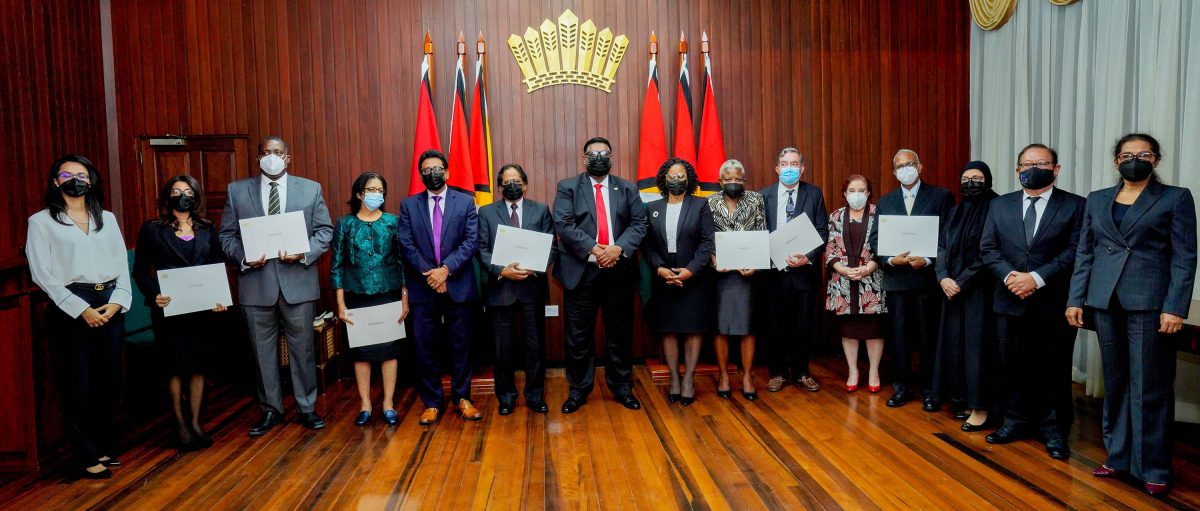The members of this country’s first Law Reform Commission were yesterday sworn in by President Irfaan Ali, who charged them to ensure to not only work on changes to Guyana’s archaic laws but to keep abreast with the rest of the world, particularly with an oil and gas economy set to economically transform the country.
“The work of the Commission is critical to ensuring that Guyana keeps abreast with evolving and emerging legislation with the rest of the world. The work of the Commission is to ensure that our country’s legislation does not stagnate or become backward. The work of the Law Reform Commission will be both of benefit to the executive and the National Assembly,” Ali yesterday declared at the swearing in ceremony for the seven members of the Commission at the Office of the President.
The members, who will serve the first three-year period of the Commission’s life are its Chairman, retired Justice of Appeal B S Roy, and Teni Housty, Clarissa Riehl, Brian O’ Toole, Emily Dodson, Roopnarine Satram, and Deenawatie Panday, who are all attorneys.
When their names were announced last month by government, it was stated that they were chosen after consideration of recommendations received from the various stakeholder organisations that were consulted pursuant to the provisions of the Law Reform Commission (Amendment) Act. Those stakeholders canvassed for nominations included the Private Sector Commis-sion, the labour movement, the religious community, the constitutional rights commissions, the judiciary organisations representing the legal profession, the Guyana Human Rights Association, and the National Toshaos Council.
The Law Reform Com-mission is an advisory body to the State and can recommend to the Government of Guyana amendments to existing laws, new legislation, and the repeal of existing legislation.
Underscoring that legal reform was a priority of his administration and that he will ensure it gets “full support,” Ali promised the Commission that he will “treat with the utmost seriousness, its recommendations.”
However, he pointed out that he believes that “legal reform must not frustrate development” and “it must ensure greater trust between citizens and the justice system.”
“Our economy is changing and our laws have to reflect this. The environment in which we are operating globally is also changing and we have to adapt to those changes. The nature of the new world order itself is changing daily and we have to adapt to those changes. And an important part of adapting to those changes is ensuring that the legal system reflects where the country must go in adapting,” he said.
“Legal reforms must enhance and not inhibit human rights. Legal reforms must, as a necessity, empower citizens and protect them from arbitrariness,” he added.
‘Better late than never’
Attorney General Anil Nandall, in his remarks at the ceremony, pointed out that while this is the first time the country is having a Law Reform Commission, it the norm in other democracies and we are thus “way behind.”
However, he said it was “better late than never and we are here now.”
The Attorney General echoed the President’s position on the integral role the Law Reform Com-mission has in in the country’s development. “It has a very important role to play socially. Economically, as you know, we are at a particular precipice in our history, in terms of our economic takeoff. That will require the revamping of existing laws as well as the introduction of new laws, to meet the new exigencies that will arise in the new economic heights that we are expected to reach. The Law Reform Commission, again, will play a pivotal role in that process,” Nandlall said.
He explained that the Commission will work closely with the Chief Parliamentary Counsel and the Drafting Department of the AG’s Chambers and that their office will be located in Middle Street.
According to Nandlall, much work awaits the team and they will begin by joining him on a project to “revise the laws” as the last revision exercise concluded in 2012 and prior to that the last one was 1977.
“Trust me, there is a lot of law reform to be done in the pipeline… I can tell you, in the entire public health sector. We have about 20 pieces of legislation there alone. We have in the agriculture sector, a whole series of legislation.”
As it pertains to Guyana’s petroleum sector, Nandlall said that they have not even “touched” work on that sector and it is that which will urgently need a comprehensive revamping to cater to global standards and circumstances for a sector expected to be this country’s biggest income earner for at least the next four decades.
“In that sector a tender went out to invite bids from international companies to work on a project which will be a comprehensive examination of our statutory architecture in terms of the oil and gas sector and to amend and redraft and put in new laws where necessary. As you know, it is a very important area and specialised. But in almost every area, there will be law reform. They will be quite busy, I can tell you that,” he said.
But he was quick to point out that all reform will be catered to the “peculiar circumstances of our country.”
The establishment of a Law Reform Commission is part of a fundamental component of the US$8 million Inter-American Development Bank (IDB)-funded Support for the Justice System Program-me. The IDB shall fund the functioning of the Com-mission for a specified period, it added, and the Government of Guyana is expected to take over funding thereafter.
